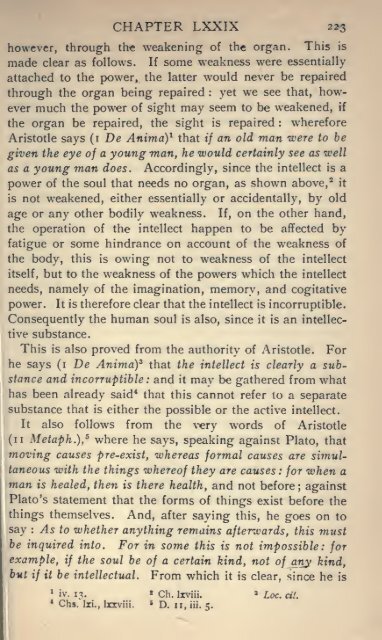summa-contra-gentiles
Summa
Summa
Create successful ePaper yourself
Turn your PDF publications into a flip-book with our unique Google optimized e-Paper software.
CHAPTER LXXIX<br />
2^<br />
however, through the weakening of the organ. This is<br />
made clear as follows. If some weakness were essentially<br />
attached to the power, the latter would never be repaired<br />
through the organ being repaired yet we see that, however<br />
much the power of sight may seem to be weakened, : if<br />
the organ be repaired, the sight is repaired : wherefore<br />
Aristotle says (i De AnimaY that if an old man ivere to be<br />
given the eye of a young -man, he would certainly see as well<br />
as a young man does. Accordingly, since the intellect is a<br />
power of the soul that needs no organ, as shown above,' it<br />
is not weakened, either essentially or accidentally, by old<br />
age or any other bodily w^eakness. If, on the other hand,<br />
the operation of the intellect happen to be affected by<br />
fatigue or some hindrance on account of the weakness of<br />
the body, this is owing not to weakness of the intellect<br />
but to the weakness of the powers which the intellect<br />
itself,<br />
needs, namely of the imagination, memory, and cogitative<br />
power. It is therefore clear that the intellect is incorruptible.<br />
Consequently the human soul is also, since it is an intellective<br />
substance.<br />
This is also proved from the authority of Aristotle. For<br />
he says (i<br />
De AnimaY that the intellect is clearly a sub-<br />
from what<br />
stance and incorruptible<br />
: and it may be gathered<br />
has been already said* that this cannot refer to a separate<br />
substance that is either the possible or the active intellect.<br />
It also follows from the very words of Aristotle<br />
(11 Metaph.),^ where he says, speaking against Plato, that<br />
moving causes pre-exist, whereas formal causes are simultaneous<br />
with the things whereof they are causes :<br />
for when a<br />
man is healed, then is there health, and not before; against<br />
Plato's statement that the forms of things exist before the<br />
things themselves. And, after saying this, he goes on to<br />
say As to whether anything remains :<br />
afterwards, this must<br />
be inquired into. For in some this is not impossible<br />
:<br />
for<br />
example, if the soul be of a certain kind, not of any kind,<br />
but if it be intellectual. From which it is clear, since he is<br />
* »v- * 13.<br />
Chs. Ixi., Ixrviii.<br />
* Ch. lx\'iii.<br />
* D. 11, iii. 5.<br />
» Loc. cii.


















